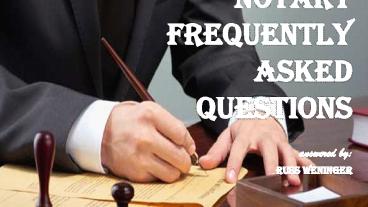Notary FAQ answered by Russ Weninger PowerPoint PPT Presentation
Title: Notary FAQ answered by Russ Weninger
1
NOTARY Frequently Asked Questions
- answered by
- Russ Weninger
2
Question
What is the difference between a notary public
and a commissioner for oaths?
3
Answer
In Alberta, a notary public can do whatever a
commissioner for oaths can do, but a commissioner
for oaths may not have all the powers of a notary
public. In Alberta, a notary public is
automatically a commissioner for oaths, but the
reverse does not hold a commissioner for oaths
is not automatically a notary public..
4
Answer
A notary public can certify copies of documents
and can act as a witness for documents that are
to be used outside of Alberta. A commissioner for
oaths generally cannot certify copies of
documents and should not typically act as a
witness for documents meant to be used outside of
Alberta
5
Question
Do I have to appear in person before a notary
public to get a document notarized?
6
Answer
Typically, yes. A notary public can be thought of
as a professional witness. When a signature is to
be witnessed, the person signing the document
must appear before the notary public, and must
prove his or her identity, usually with
government issued picture ID such as a driver's
license or passport. For documents such as
certified copies, rather than requiring a person
to appear before a notary public, an original
document must be viewed by a notary public.
7
Will you notarize or act as a witness for a will
prepared by me in advance?
8
Answer
Typically, no. A will is an important legal
document that should be drafted with the
assistance of a lawyer. While it is not a legal
requirement to have a will prepared (or for that
matter witnessed) by a lawyer, it is a document
that has such significance that under almost all
circumstances a lawyer should be involved with a
will's preparation. Also, when a lawyer assists
in any way with a will, that lawyer runs the risk
of being sued by disgruntled beneficiaries at a
later date. It may not be an adequate defence
that the lawyer was only witnessing the will and
did not assist with the drafting of the will.
9
Answer
For those reasons, if I am to sign as a witness
on a will, I must be satisfied that the contents
of the will are reasonable. This falls within the
realm of providing legal advice, and to do an
adequate job, requires that some time be spent
considering the draft will. Almost invariably,
when reviewing a proposed will drafted by a
client, I come across sections that should be
improved upon, and it is in many cases more
economically efficient to draft the will from
scratch.
10
Drop by on our site and ask questions too! visit
us at http//www.RussWeninger.com

